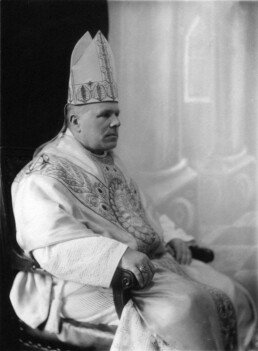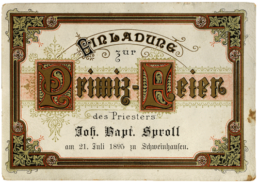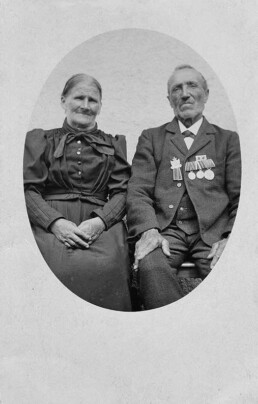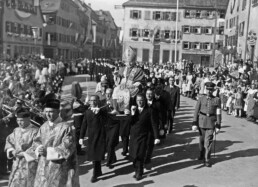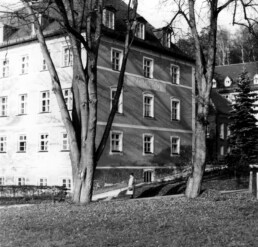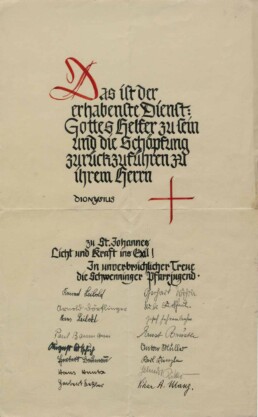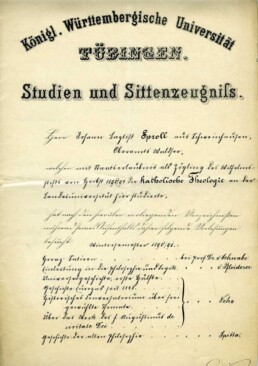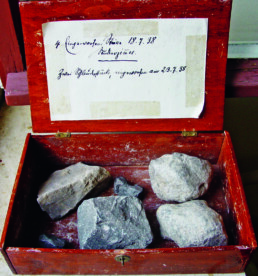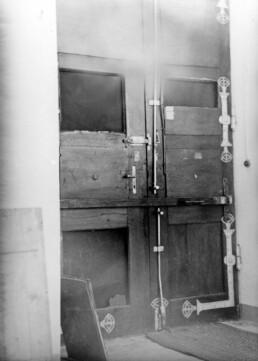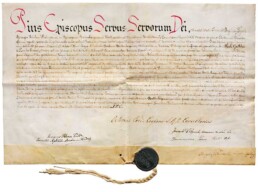Vita
Background and career
Joannes Baptista Sproll was born on October 2nd 1870, in Schweinhausen near Biberach, and grew up in simple, rural circumstances. His home pastor discovered his talent and made it possible for him to attend the Latin school. After studying theology in Tübingen and being ordained a priest, Sproll became a teacher at the Tübingen Wilhelmsstift, then Subregens at the Rottenburg seminary.
In 1909 Sproll went to Kirchen as a pastor, before Bishop Paul Wilhelm Keppler appointed him to the cathedral chapter three years later. In the following year Sproll became vicar general, and in 1916 auxiliary bishop. From 1912, he sat as a representative of the cathedral chapter in the Stuttgart state parliament. In 1919 he was elected as a representative of the Center Party in the state constitutional assembly. After the death of Bishop Keppler, the cathedral chapter chose Sproll as his successor in 1927 – and in difficult times: the global economic crisis at the end of the 1920’s led to a strengthening of extremist parties, the Communists and the National Socialists. With his popularity, common touch and open character, Sproll relied entirely on preserving traditional beliefs in the face of these tendencies.
Opponent of National Socialism and persecution
As early as 1931, in a declaration by the southwest German bishops, Bishop Sproll condemned National Socialism as “incompatible with Catholic teaching”. After Hitler had legally become Chancellor in 1933, the German bishops recognized him as a legitimate authority.
From the summer of 1934, Sproll exposed himself as a staunch opponent of National Socialism. In sermons he publicly spoke out against the central content of Nazi ideology, against the idolatry of race and blood, and German-ethnic tendencies. From April 1938 onwards, the conflict escalated dramatically. Bishop Sproll set a public sign of refusal by not taking part in the election on the annexation of Austria to the Reich, which had already taken place, in order not to have to elect National Socialists to the Reichstag at the same time. The National Socialists reacted with a wave of staged demonstrations and riots allegedly resulting from spontaneous popular anger.
Banishment and exile
The attempts by the National Socialists to persuade Sproll to resign from office “voluntarily” failed: he was not intimidated by the riots. In addition, sections of the Catholic population expressed their solidarity with the persecuted clergyman, who was perceived as a courageous “confessing bishop”. Eventually however the bishop was banished from his diocese. In September 1938, Sproll found refuge in the Benedictine abbey of St. Ottilien in the diocese of Augsburg. Due to the deterioration in his health, he moved to the Krumbad spa in early 1941.
Sproll also held his office as Rottenburg diocesan bishop in exile, as far as possible. He wrote pastoral letters and stayed in contact with the cathedral chapter. In 1943 he carried out the consecration of the diocese to Mary from his exile in Krumbad, which met with a great response.
Homecoming and death
Only with the end of World War II and the collapse of the Nazi regime was the way made clear for the bishop’s return. Thousands of believers attended the return celebration on June 14, 1945 and his 50th anniversary as a priest. Despite his illness, Sproll visited many parishes throughout the diocese in the following years. The image of the bishop, marked by illness and exile, who had to be carried through the crowd in a chair because of his paralysis, was imprinted on the collective memory.
Sproll emphasized the readiness for reconciliation. His work was focused on future-oriented tasks, reconstruction after the destruction, Christian charitable engagement with economic and spiritual hardship, and the integration of the displaced. He died on March 4, 1949.
Aftermath and reception
Joannes Baptista Sproll distinguished himself as a determined opponent of National Socialism, who courageously went out on a limb by seeking public confrontation.
The National Socialists did not take such significant action against any other German bishop. While other bishops, such as the Münster bishop von Galen, or the Berlin bishop von Preysing, were elevated to cardinals in 1946, Sproll was denied this honor. However the Rottenburg bishop was indeed honored as a ‘confessor’ after his return and in obituaries after his death. Outside the diocese, however, his courageous demeanor and fate received little attention for a long time.
More recent research is paying more and more attention to Sproll in the context of resistance to National Socialism. In 2011, the Diocese of Rottenburg initiated a beatification process for him.
